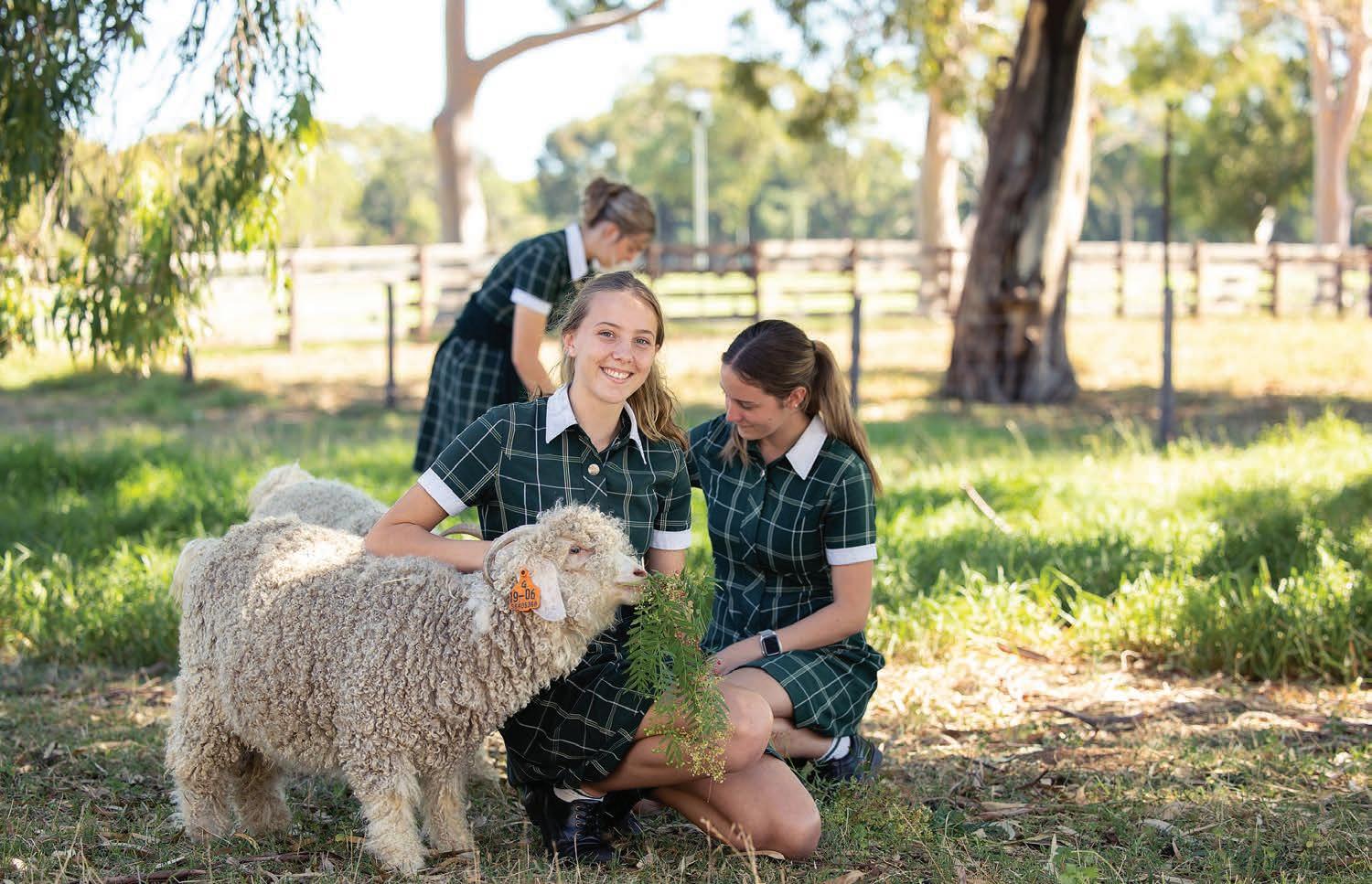
8 minute read
Principally Speaking: Westminster School
Westminster School Principal Simon Shepherd inside the race of the new Thomas Pavilion in the School’s sporting precinct.
Leading by example
WESTMINSTER SCHOOL PRINCIPAL SIMON SHEPHERD SPEAKS TO EDUCATION MATTERS ABOUT HOW ITS GRADUATES ARE ULTIMATELY NOT REMEMBERED FOR THEIR ATAR OR QUALIFICATIONS, BUT RATHER FOR THE POSITIVE WAY THEY INTERACT WITH OTHERS AND CONTRIBUTE TO THE SOCIETY.
EWHAT IS THE SCHOOL’S PHILOSOPHY AND
HOW DOES IT GUIDE YOU AND YOUR STAFF?
Westminster students are encouraged by our staff to achieve more than they thought possible. We want our students to leave school equipped cognitively, emotionally, and spiritually with the skills they need in life to achieve eudemonia. Helping students of all ages achieve this during their formative years becomes a guiding beacon for all staff.
HOW DOES THE SCHOOL DIFFER FROM OTHER SCHOOLS?
We aspire to ensure that our graduates are ultimately not remembered for their ATAR or qualifications, but rather for the positive manner in which they interact with others and contribute to our society. Of course, this grounding starts in their primary years. As students age, we also offer a number of significant pennant programs. Perhaps the most influential of these is our Outdoor Education program, which encompasses the Duke of Edinburgh’s International Awards where we regularly receive the most Gold Awards in South Australia. We are one of only two Round Square Schools in South Australia, providing our students with great opportunities to develop internationalism and relationships with schools and students from around the nation and world.
WHAT IS THE HISTORY OF THE SCHOOL?
Westminster School was initially founded by the Methodist Church to provide another boarding school in Adelaide, offering educational opportunities for rural students. Our doors opened in 1961 and cater for Years 1 to 8 (equivalent). Over 60 years, we have grown into a significant coeducational day and boarding ELC to Year 12 school of around 1200 students.
WHAT YEAR WAS THE SCHOOL ESTABLISHED?
Westminster was established in 1961 as a boys’ school and became coeducation in 1978. The sheer size of the campus, originally destined for housing, is evidence of the resolve and influence of the School’s founders and we remain forever grateful to them for their vision. Nestled between the city and sea in the southwest suburb of Marion, the Westminster campus is one of the largest in Adelaide.
IN WHAT WAYS HAS THE EVOLVED SINCE IT WAS ESTABLISHED?
The greatest evolutionary step was the move to coeducation in 1978. We have also grown and expanded adding and an Early Learning Centre (ELC) and Out of School Hours (OSHC) to include a comprehensive holiday program. We have always been a community-focused school, and this has been carefully cultured. We are also an exceptionally well-resourced school. We have grown and evolved with a studentcentred approach, ensuring that our students are always at the centre of our decision-making processes.
HOW DO YOU PROVIDE SUPPORT AND LEADERSHIP TO YOUR STAFF?
With a firm belief in servant leadership, leading by example and the notion that leaders ‘eat last’, I endeavour to provide support and leadership by empowering staff to reach their potential. I look to distribute leadership and, where the situation allows, extend this to consulting.
We have and will continue to develop strategic plans from a shared pool of understanding which then allows me, and the rest of the School Leadership Team, to adopt a ‘follow me I am right behind you approach’, where staff are
guided by the strategic plan and empowered to achieve their goals within it.

WHAT ROLE DO YOU PLAY IN THE DAY-TO-DAY ACTIVITIES OF YOUR STUDENTS?
As Principal, I try to be visible to the students, they are not surprised if I ‘gate-crash’ their classes to see what they are doing. I try to lead by example for the students, adopting the tenant that I can’t ask them to do something I wouldn’t do myself.
Weekends and holidays are times where I try to see students in a context out of the classroom where I will watch them play sport and attend camps they are on. I have even skied out onto the Bogong High Plains to meet a Secondary School Cross Country ski trip and share half a dozen blocks of chocolate with them.
WHAT ARE SOME OF THE CHALLENGES FACED BY TEACHERS IN THE SECTOR?
Teachers are challenged by the pressure being put on schools to be a panacea. Not only do teachers have to address the National Curriculum or relevant State Curriculum, but they are also expected to teach consent, acceptance, appropriate behaviour, morals and even ethics.
On top of this, there is a growing trend of inappropriate attributions where, increasingly, accountability for one’s actions is being attributed to external causes. Less people are accepting open accountability for what they do. At times when a student makes an inappropriate attribution, it is supported by parents and this, in effect, undermines the teacher, the school and even the child. It severely limits growth opportunities and can lead to unrealistic self-perception. We see this as important to instil in the earliest years of education and continue to flex and adapt as students grow and develop.
Westminster is one of only two Round Square Schools in South Australia, providing students with great opportunities to develop internationalism and relationships around the world.
WHAT HAS BEEN MY MOST MEMORABLE MOMENT EITHER AS A TEACHER OR SPECIFICALLY IN THE ROLE OF PRINCIPAL?
The standout moment for me was some years ago when a young man, for whom I had been the Director of Boarding and was his Year 12 Geography teacher at his school, called me almost seven years after leaving to thank me. His journey through school and boarding was not easy. Male role models in his life had not lived up to his expectations and we had a challenging journey together. In Year 12, he went from a D grade student to a solid B and he rang out of the blue to thank me.
At the time of the call, I was driving my partner to hospital for cancer treatment and his call reduced me to tears. As an educator you can often be unaware of the positive impact you can have on students and their lives. To have helped this young man to the extent he called me like that was most humbling and a true reflection on the importance of the profession and its lasting impact.

WHAT ARE YOUR FEELINGS ABOUT NAPLAN AND ITS EFFECTIVENESS?
In Australia our National Curriculum is the framework that states work independently within. Each state has its own matriculation process, which are ‘melded’ by the ATAR. Given this, one standardised benchmark test that allows for measurement of growth on a longitudinal journey is a really good idea. It allows teachers to see the value add they provide to students and how both their cohorts and students are growing and tracking against benchmark data.
However, when NAPLAN results are used like a rolled-up newspaper to beat teachers with and create a league table for schools, they are very unhelpful. Likewise, when the results are framed, pinned on the wall, and boasted about at BBQs, they are equally unhelpful.
Westminster School was initially founded by the Methodist Church to provide another boarding school in Adelaide. Today it is has around 1200 students.
WHAT TRAITS MAKE FOR AN EFFECTIVE AND SUCCESSFUL LEADER IN EDUCATION TODAY?
In Australia right now there are enormous pressures that have been created by COVID-19. Educational leaders are sensing a real and ominous threat of a youth mental health epidemic as a consequence of the pandemic with its associated isolations, quarantines and guidelines. More than ever, they must have a very broad skill set that includes showing situational, transformational, and inspirational leadership all at once. They also must have academic and business acumen. They need to be resilient, beyond belief, and be prepared to be praised one day and burnt at the stake the next. As a list of qualities, they need to: • have empathy • be brave • be altruistic • be congruent • show appropriate determination • be accepting
• exercise intelligent disobedience • be a role model • be prepared to communicate excessively so that the communication ‘gap’ or ‘silence’ around
COVID-19 is not filled with humbug • understand that communities will expect them to live by a different set of standards to how they live themselves • be prepared to be bullied, upwardly by some members of the community they are striving to serve.
Leaders, particularly, have to be prepared to be lonely. They have to acknowledge that success is passed on to the team, yet failure rests with them. Increasingly in Australia, leaders need to realise that there is an empathy valve. Educational leaders are expected, and in some cases legislated, to always show empathy, yet there can be little to none in return. This has been particularly tested by COVID-19 and highlighted throughout the pandemic. EM

Westminster students are encouraged by staff to achieve more than they thought possible.
AMUN 716
Environmental C02 Sensor Range


& THEBEN SOLEDISTR I BUTOR. VIC TAS .



